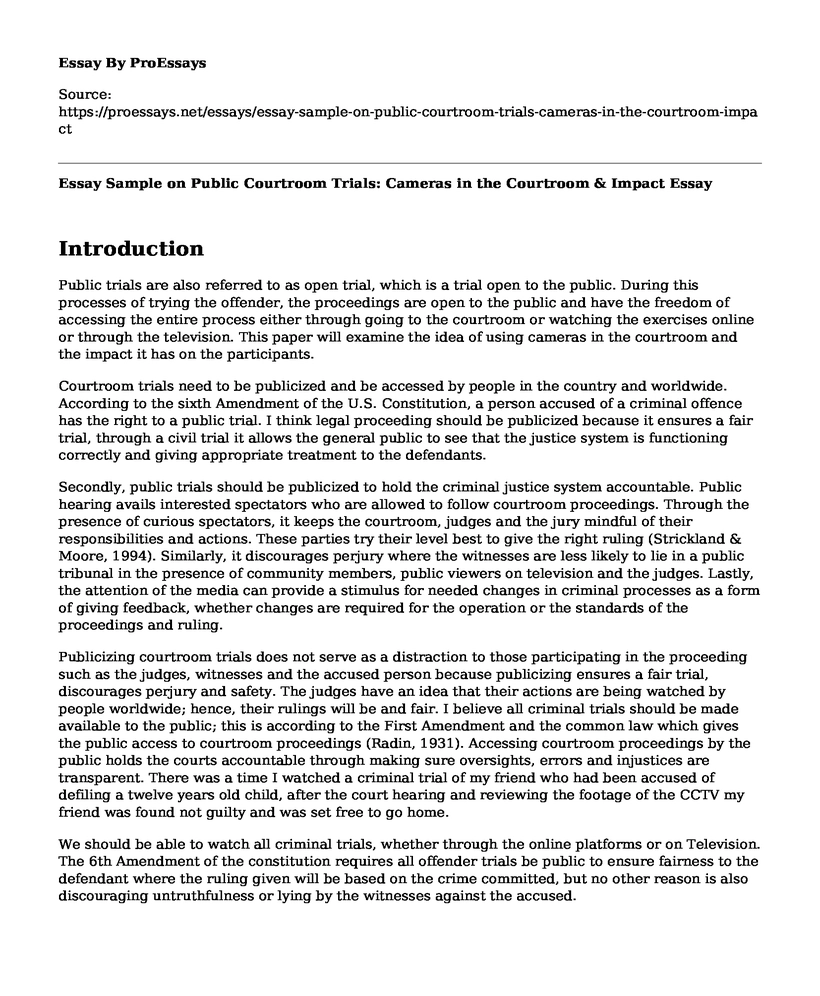Introduction
Public trials are also referred to as open trial, which is a trial open to the public. During this processes of trying the offender, the proceedings are open to the public and have the freedom of accessing the entire process either through going to the courtroom or watching the exercises online or through the television. This paper will examine the idea of using cameras in the courtroom and the impact it has on the participants.
Courtroom trials need to be publicized and be accessed by people in the country and worldwide. According to the sixth Amendment of the U.S. Constitution, a person accused of a criminal offence has the right to a public trial. I think legal proceeding should be publicized because it ensures a fair trial, through a civil trial it allows the general public to see that the justice system is functioning correctly and giving appropriate treatment to the defendants.
Secondly, public trials should be publicized to hold the criminal justice system accountable. Public hearing avails interested spectators who are allowed to follow courtroom proceedings. Through the presence of curious spectators, it keeps the courtroom, judges and the jury mindful of their responsibilities and actions. These parties try their level best to give the right ruling (Strickland & Moore, 1994). Similarly, it discourages perjury where the witnesses are less likely to lie in a public tribunal in the presence of community members, public viewers on television and the judges. Lastly, the attention of the media can provide a stimulus for needed changes in criminal processes as a form of giving feedback, whether changes are required for the operation or the standards of the proceedings and ruling.
Publicizing courtroom trials does not serve as a distraction to those participating in the proceeding such as the judges, witnesses and the accused person because publicizing ensures a fair trial, discourages perjury and safety. The judges have an idea that their actions are being watched by people worldwide; hence, their rulings will be and fair. I believe all criminal trials should be made available to the public; this is according to the First Amendment and the common law which gives the public access to courtroom proceedings (Radin, 1931). Accessing courtroom proceedings by the public holds the courts accountable through making sure oversights, errors and injustices are transparent. There was a time I watched a criminal trial of my friend who had been accused of defiling a twelve years old child, after the court hearing and reviewing the footage of the CCTV my friend was found not guilty and was set free to go home.
We should be able to watch all criminal trials, whether through the online platforms or on Television. The 6th Amendment of the constitution requires all offender trials be public to ensure fairness to the defendant where the ruling given will be based on the crime committed, but no other reason is also discouraging untruthfulness or lying by the witnesses against the accused.
Conclusion
In conclusion, the sixth amendment of the constitution of the USA constitution gives the right of the accused person to a public trial. A person who is interested in watching or listening to court proceeding can attend the procedure in the court. Publicizing the courtroom proceedings assures the defendant of fair trial and prevents false witnesses.
References
Radin, M. (1931). The Right to a Public Trial. Temp. LQ, 6, 381.Retrieved from https://heinonline.org/hol-cgi-bin/get_pdf.cgi?handle=hein.journals/temple6§ion=40
Strickland, R. A., & Moore Jr, R. H. (1994). Cameras in State Courts: A Historical Perspective. Judicature, 78, 128.Retrieved from https://heinonline.org/hol-cgi-bin/get_pdf.cgi?handle=hein.journals/judica78§ion=33
Cite this page
Essay Sample on Public Courtroom Trials: Cameras in the Courtroom & Impact. (2023, Jan 31). Retrieved from https://proessays.net/essays/essay-sample-on-public-courtroom-trials-cameras-in-the-courtroom-impact
If you are the original author of this essay and no longer wish to have it published on the ProEssays website, please click below to request its removal:
- Essay Sample on Gun Violence in Baltimore
- Socrates' Defense of Justice - Essay Sample
- Essay Example on IKEA Facing Human Rights Complaint at The Hague
- Prison Population: A Cross-Section of Education Levels - Essay Sample
- Essay Example on Martin Luther King Jr.: A Civil Rights Hero for Equality
- Essay Example on the Uncertainty of US Voting Rights: A Historical Perspective
- Esasy on Pros & Cons of Marijuana Use: A Debate







